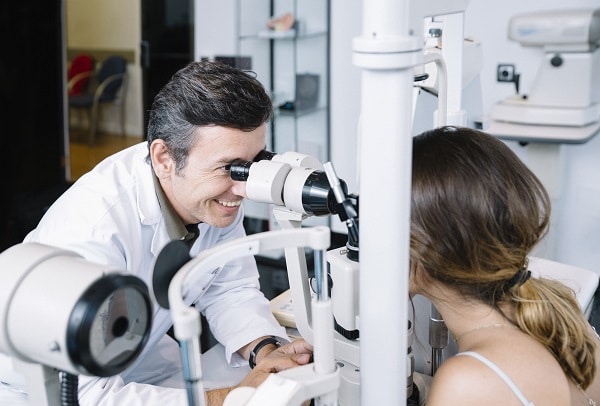There are things you can do to maintain your eye health, and we’re going to go over some of the essential tips. Often, people don’t think about their eyes until something goes wrong, so it’s necessary to be proactive in taking care of them. By following these simple tips, you can help keep your eyes healthy and looking good for years to come!
Contents
Stay Hydrated

Keeping your body hydrated is vital for your overall health, including your eyes. When you’re dehydrated, your eyes can become dry and irritated. You may also experience blurry vision and headaches. In severe cases, dehydration can lead to painful conditions like glaucoma. So how much water should you drink to maintain healthy eyes? While there is no hard and fast rule, the general recommendation is to consume eight glasses of water per day. However, this may vary depending on your activity level, climate, and diet. If you live in a hot climate or exercise frequently, you may need to drink even more water to prevent dehydration. And if you eat a lot of salty foods or drink caffeinated beverages, you may need to drink more water to offset the diuretic effects. To be safe, it’s always best to consult with your doctor or an eye care specialist about how much water you should be drinking each day.
Get Enough Sleep

We all know that getting a good night’s sleep is essential for our overall health, but did you know that it’s also necessary for maintaining healthy eyes? When we don’t get enough sleep, our bodies can’t properly repair and regenerate, leading to many problems, including dry eye, poor vision, and vision loss. There are a few things you can do to make sure you’re getting enough shut-eye each night:
- Try to stick to a regular sleep schedule as much as possible. Going to bed and waking up simultaneously each day will help your body get into a rhythm and make it easier to fall asleep and stay asleep.
- Create a relaxing bedtime routine to prepare your mind and body for sleep, including reading, taking a bath, or listening to calm music.
- Limit your exposure to blue light in the evening by turning off screens at least an hour before bedtime.
By following these simple tips, you can help ensure that you’re getting the sleep you need to keep your eyes healthy and happy.
Avoid Rubbing Your Eyes

It’s so tempting to rub your eyes when they feel dry, itchy, or just plain tired. Unfortunately, rubbing your eyes can lead to more irritation and inflammation. When you rub your eyes, you are putting pressure on the delicate eye tissues, which can damage blood vessels and cause swelling. In addition, rubbing your eyes can spread bacteria and viruses, leading to conjunctivitis or other infections. So next time you feel the urge to rub your eyes, resist the temptation! Instead, try using artificial tears or a warm compress to ease the irritation. If you have any concerns about your eye health, consult with an ophthalmologist.
Wear Sun Glasses

Wearing sunglasses is not just a matter of looking fashionable. Sunglasses play an essential role in protecting your eyes from the harmful effects of ultraviolet (UV) radiation. Prolonged exposure to UV radiation can damage the cornea, retina, and other parts of the eye, leading to cataracts, macular degeneration, and cancer of the eye. Wearing sunglasses that block out 99-100% of both UVA and UVB radiation can help to reduce the risk of these conditions. In addition, sunglasses can help to reduce glare, making it easier to see on bright days. So, next time you head outdoors, don’t forget to grab your shades. Your eyes will thank you for it.
Don’t Smoke

As any smoker knows, quitting cigarettes is difficult. However, the benefits of quitting smoking are well worth the effort. One of the most important reasons to quit smoking is to protect your eye health. Cigarette smoke contains many harmful chemicals, including tar and carbon monoxide. These substances can damage the eye’s delicate tissues, leading to dryness, irritation, and even vision loss. In addition, smoking increases your risk of developing age-related macular degeneration, a leading cause of blindness. You can significantly reduce your risk of developing these and other serious eye problems by quitting smoking. So if you’re looking for another reason to quit smoking, consider the impact it could have on your eye health.
Eat A Healthy Diet

Eat A Healthy Diet to maintain good eye health. Consuming a diet rich in vitamins A, C, and E, zinc, and omega-3 fatty acids can help protect your vision and keep your eyes healthy as you age. These nutrients play essential roles in maintaining the health of your eyes and vision, including:
• Vitamin A: Helps to protect against night blindness and dry eyes. Found in foods such as carrots, sweet potatoes, spinach, kale, eggs, and dairy products.
• Vitamin C: Helps to prevent cataracts. Found in foods such as citrus fruits, strawberries, tomatoes, bell peppers, broccoli, and brussels sprouts.
• Vitamin E: Helps to protect against age-related macular degeneration. Found in foods such as nuts, seeds, and leafy green vegetables.
• Zinc: Helps to prevent night blindness. Found in foods such as oysters, crab, lobster, beef, pork, beans, nuts, whole grains, fortified cereals, and dairy products.
• Omega-3 Fatty Acids: Help protect against dry eyes and age-related macular degeneration. Found in fatty fish such as salmon, tuna, mackerel; flaxseeds; and walnuts.
Visit Your Eye Doctor Regularly

Just as you visit your family doctor for a check-up and a clean bill of health, it’s essential to see your eye doctor regularly. Routine eye exams can help detect vision problems, eye disease, and other early conditions that are most treatable. During a comprehensive eye exam, your eye doctor will determine whether you need corrective lenses and will check for signs of severe eye conditions such as cataracts, glaucoma, and macular degeneration. They also will look for evidence of diabetes and high blood pressure. If you have a family history of eye disease, you may need to see your eye doctor more often. Children should have their first comprehensive eye exam at six months of age, followed by another at age three and before entering the first grade – even if they seem to see well. After that, children who don’t wear corrective lenses should have their eyes checked every two years until age 18. Adults should have their eyes checked at least once between ages 18 and 60, even if they don’t wear glasses or contact lenses. Everyone over age 60 should have their eyes examined every two years.”
Start Maintaining Your Eye Healthy Today!
So start making healthy choices for your eyes today! These are just a few simple tips to help maintain your eye health. By following these tips, you can help keep your eyes healthy and avoid vision problems in the future.


